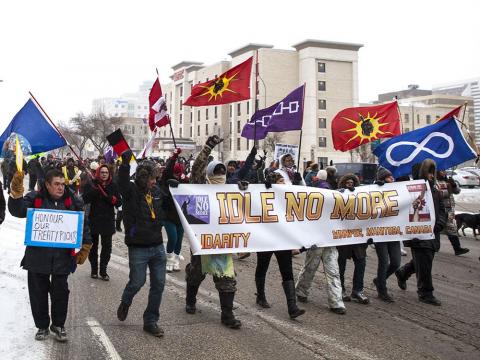The second Liberal leadership debate began in Winnipeg this past weekend with the moderator posing a series of vapid questions to unlikely leadership contender Karen McCrimmon in a format comparable to an episode of Ellen DeGeneres.
In short, the audience was settling in for a long afternoon.
But that afternoon was derailed, and the spotlight briefly stolen, by a large Aboriginal man striding into the venue, beating a hand drum and screaming angrily “Idle No More!”
As security attempted to calm the man down, and as they escorted him out, he continued yelling. He demanded to see Justin Trudeau, furiously denounced Pierre Trudeau’s 1969 White Paper on Indian Policy and added to the wider audience: “You sit here while my people are starving.”
The sudden outburst cut through the cordial questioning and presented a stark contrast, rooted in a profound sense of guilt, between the audience and the rather haggard man standing before them.
The event was held in the re-developed, 93-year-old Metropolitan Theatre, which possesses all the faux opulence of an immaculately restored neo-classical structure built on what is ultimately Treaty One land.
The audience, predominantly white and middle-class, paid $20.00 to be there.
[related_content slugs=”routing-out-seedy-hotel-bars-shows-disdain-for-winnipeg-and-all-cities,assessing-prairie-power-part-four-who-are-we-where-are-we-going,why-the-liberal-party-of-canada-is-dead-on-the-prairies” description=”More from Ethan Cabel” position=”right”]
It was as if by his outburst the man was forcing the audience to confront the exploitative nature of Canadians’ relationship with First Nations. After all, we were sitting in an environment of stuffy civility while real human misery—misery we undoubtedly helped create–exists just a few blocks away.
But this implicit argument only scratches the surface when it comes to Canada’s complex history in relation to First Nations.
What the virulently angry Aboriginal man was forcing the Liberal Party of Canada to confront, whether he knew it or not, was its growing irrelevance in the face of political and social polarization.
In the aftermath of the disruption, virtually all the candidates acknowledged the protester and paid lip service to the broader importance of the Idle No More movement.
Many of them commented, in slightly condescending terms, on its “great potential.”
Missing from their statements was the fact that a lone man had marched into the hall intent on disrupting the event. Realistically, he had no interest in speaking with the candidates.
Instead, he insinuated the Liberal Party is concealing a kind of historical racism and that the audience is complicit in the suffering of his people.
No amount of pandering or regretful diatribes about the aborted Kelowna Accord can snuff out this kind of anger. Nor can it make the party’s nuanced stance on Aboriginal affairs relevant in the face of it.
The Liberals are confronted with a similar challenge as the party turns rightward.
Large swathes of crucial Canadian voters support oil sands development, foreign investment, trade liberalization and a plethora of right-of-centre economic policies.
In part to woo these voters, the Liberals have presented slightly watered-down Tory economics.
The Grits want foreign investment and are in favour of foreign take-overs, but the criteria for net benefit needs to be clearer. They support the oil sands, but natural resources should be developed more sustainably and in consultation with First Nations. They support free trade, but, with the exception of Martha Hall Findlay, not if it means giving up some protectionist sacred cows.
This is a far cry from Thomas Mulcair’s “Dutch disease” or Ezra Levant’s “ethical oil,” just like the party’s position on Aboriginal Affairs is far removed from the heated tension between Idle No More and the federal government in general.
The Liberal Party of Canada has found itself stuck between warring factions on too many files for far too long, attempting to salvage some distinctive policy terrain.
Becoming unstuck, and being thrown back into the political spotlight, will take a lot more than lip service.
___
Ethan Cabel writes for the Spectator Tribune. Follow him at: @ethancabel1
Follow us on Twitter: @SpectatorTrib
